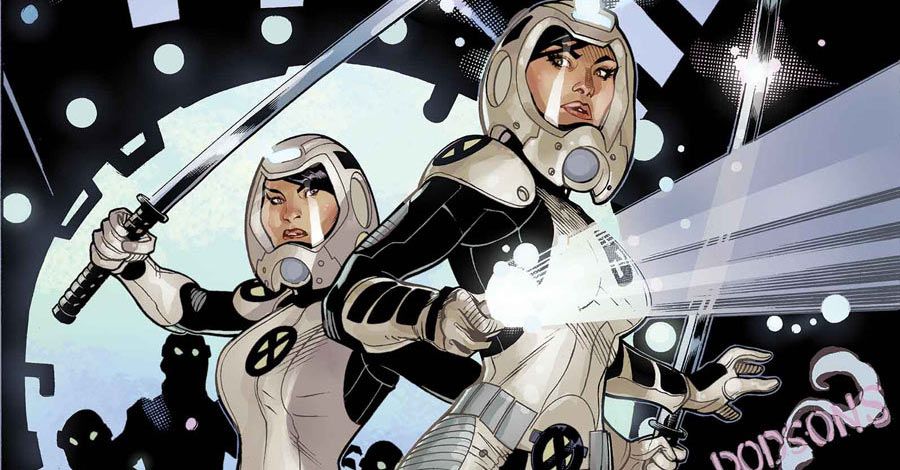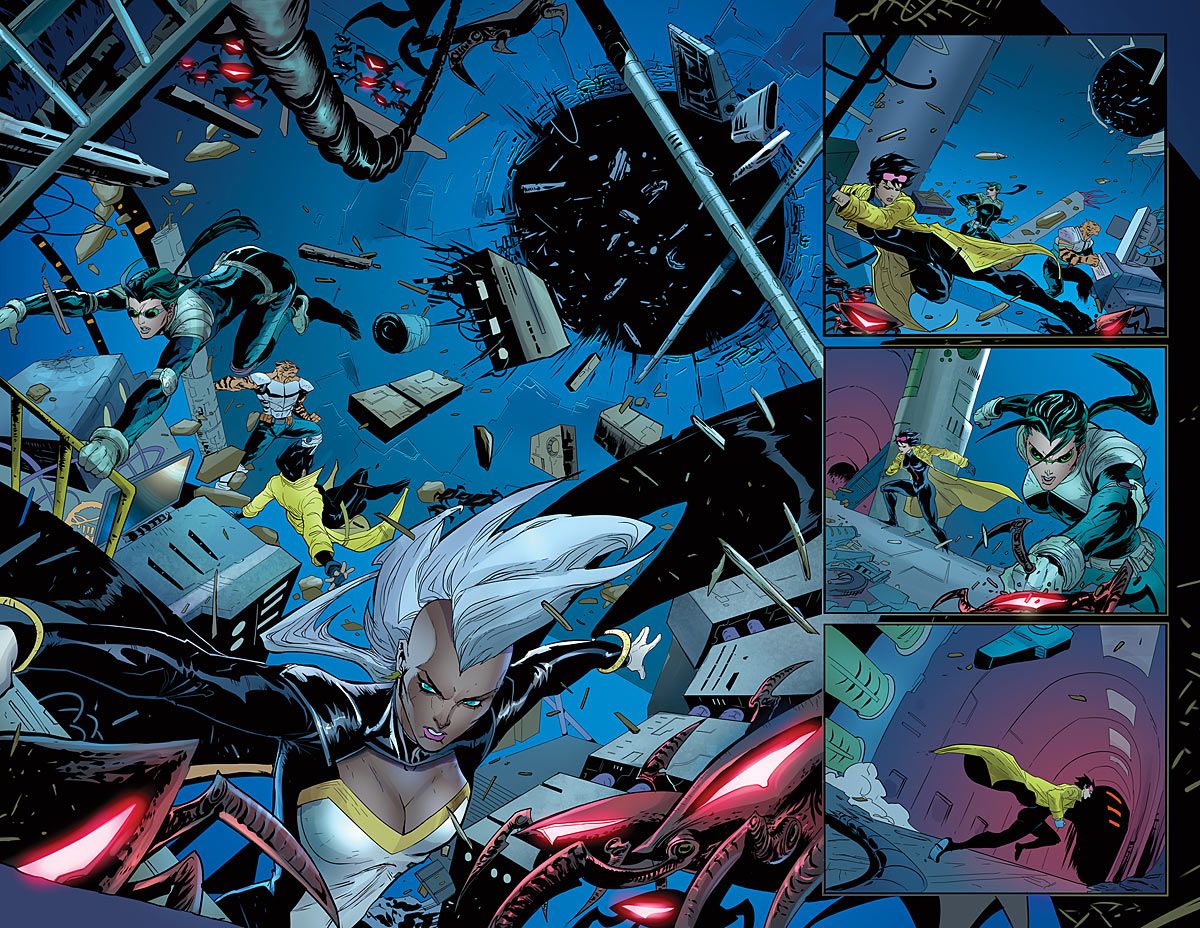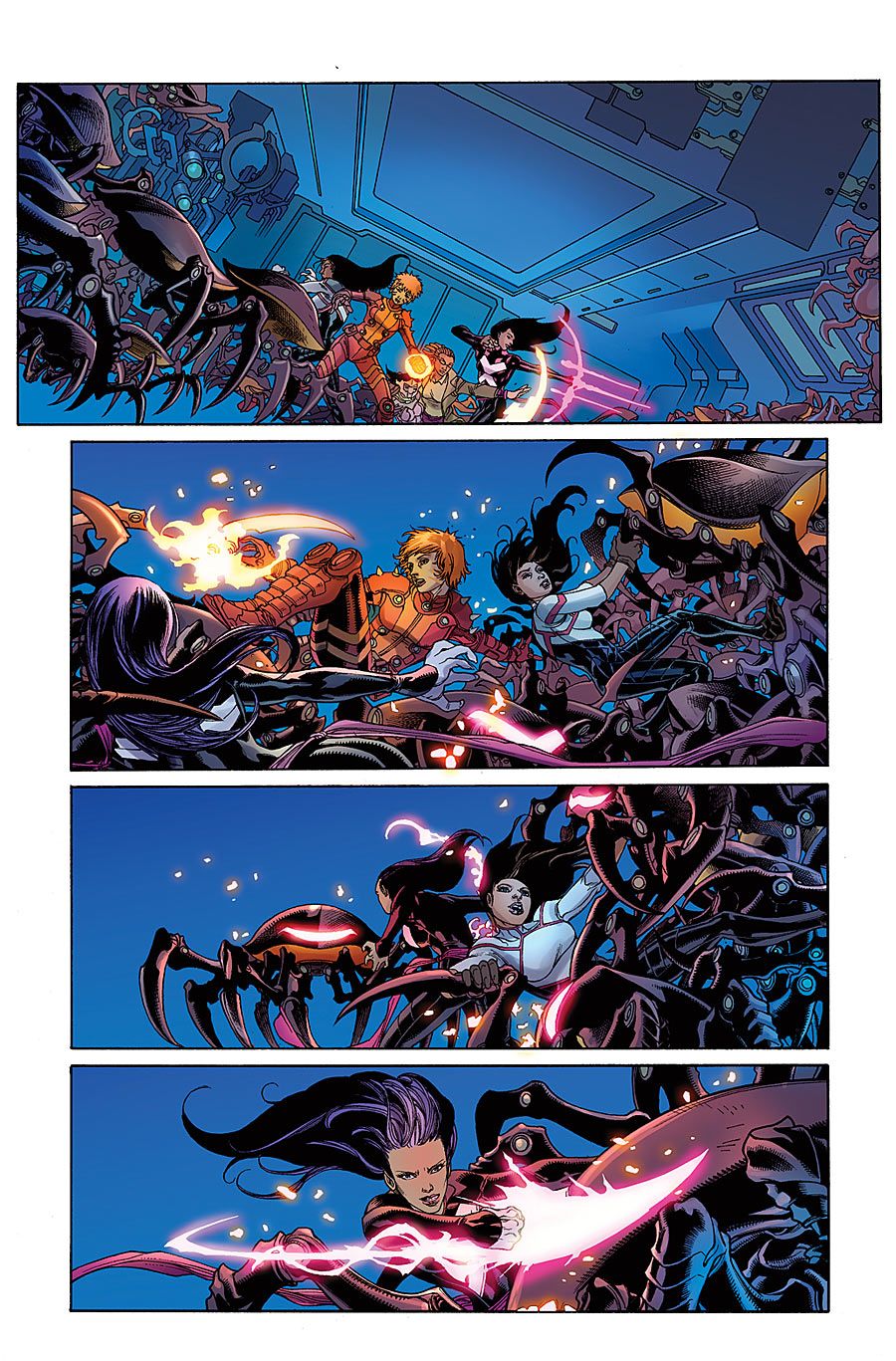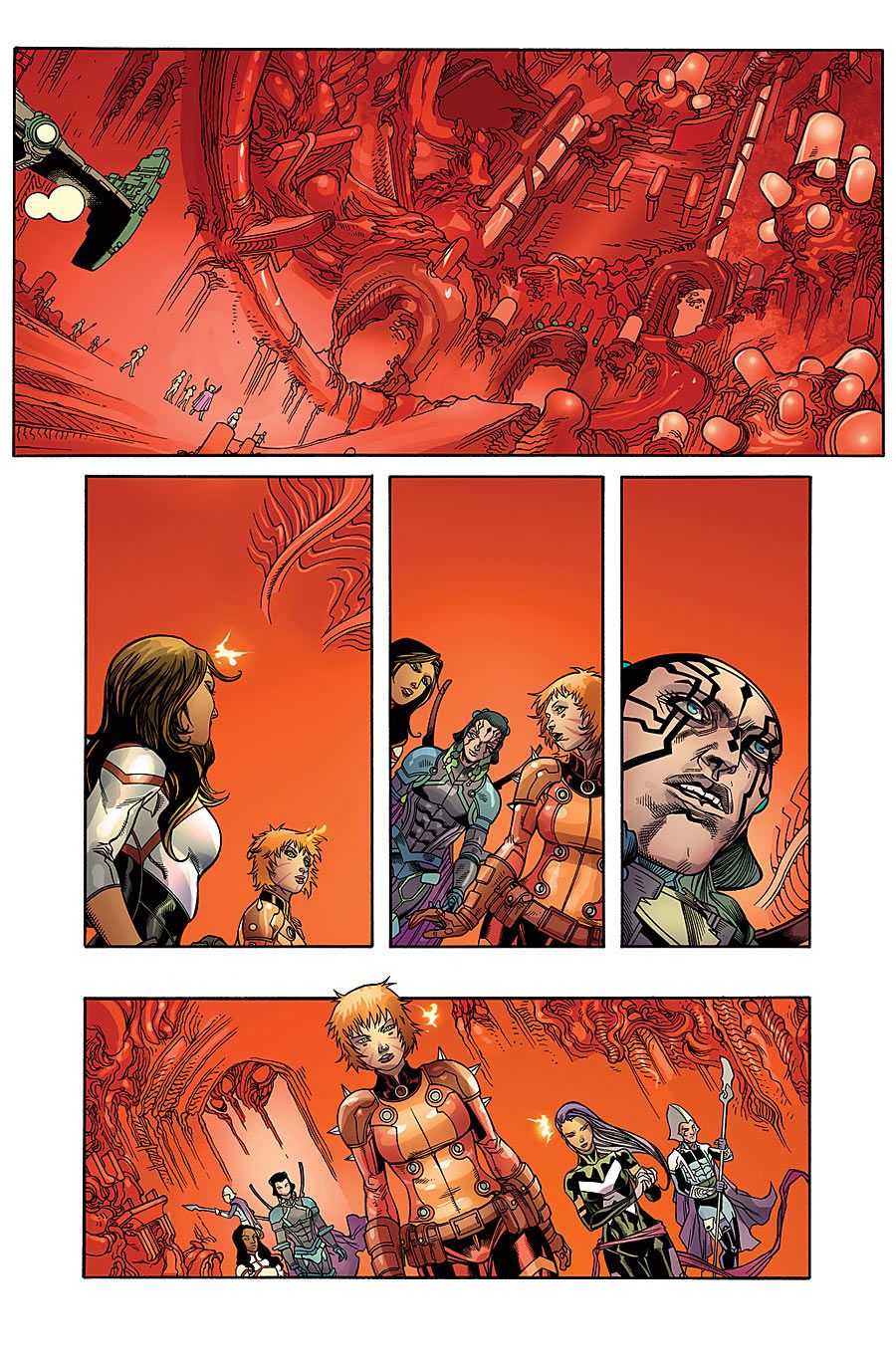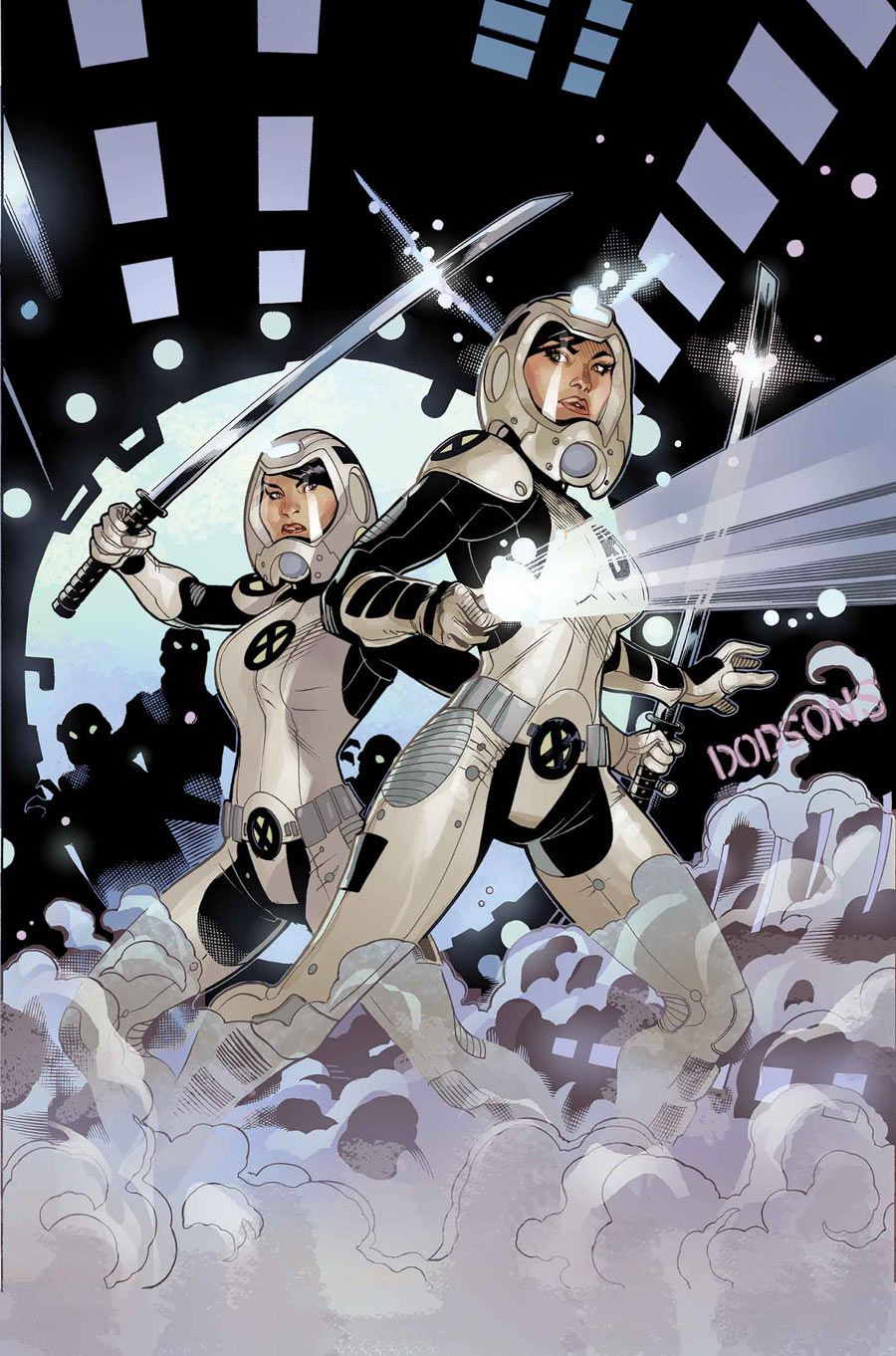While most likely know Marc Guggenheim for his role as executive producer on "Arrow," he's also an accomplished comic book writer. While his work has taken him more toward DC in recent years, he returned to Marvel last week -- teamed with artist Harvey Tolibao for a new space-oriented arc on "X-Men," marking his first major return to the X-Universe since he debuted "Young X-Men" with Yanick Paquette in 2008. Taking Brian Wood's team of Rachel Summers, Psylocke, Storm, Jubilee and Monet St. Croix, Guggenheim immediately launched the team into space, re-introducing Deathbird and the Sidri, even as the S.W.O.R.D. station became overrun.
RELATED: Guggenheim Crosses "X-Men" Off His Bucket List in Space-Faring Arc
This week, Guggenheim joined X-POSITION to discuss his current "X-Men" arc, returning to the X-Men universe after a lengthy hiatus, how his television experience with "Arrow" played into crafting the arc, his inspiration to bring the X-Men back into space and more. Plus, he discusses how he found out that his "Young X-Men" creation Ink was going to be a part of "X-Men: Days of Future Past."
CBR News: Marc, first off, welcome back to the X-Men. The last time you wrote a book in the X-Men Universe, the landscape was pretty different. What's strikes you about the place the X-Books are now compared to the last time you played in the sandbox?
Marc Guggenheim: Well, I'll tell you -- I launched "Young X-Men" right after "Messiah CompleX" and basically, we were in a little bit of a situation where there were no more mutants, but I still had to introduce new characters. Given the state of the X-Universe at the time, it wasn't the best time to launch a "New Mutants" kind of book because there was no Cyclops and I had to invent this arc to get past the first five months until the X-Universe got back on track. The timing was just unfortunate, is all. What's nice about the landscape now is that the X-Universe is very well settled. There's a lot of crazy stuff going on, but crazy for the X-Men is good. It allows me to come in and tell a story rather than try to write around stuff.
It's also great, quite frankly, to have this team of all female X-Men because they're just a great deal of fun to write.
Jumping straight into reader questions, we kick things off with cora reef, who wants to know more about how your television experience helps inform what you do in comics.
Dear Mr. Guggenheim, I'm a big fan of your work on "Arrow," and I know you've worked extensively in television in addition to comics. Since your time away from the X-Men, what have you learned from "Arrow's" success that you hope to apply to your "X-Men" run?
Well first of all, thank you cora, for the kind words. It's a really good question. I would say definitely the importance of a strong emotional core. The thing we always try to do with "Arrow" is we try to create a big budget spectacle on a small budget, quite frankly -- have cool action sequences and a lot of fun, but always make sure the action is emotionally motivated and grounded. With this "X-Men" story, I really wanted to not just provide the fun of this haunted space milieu that I was inspired to write about, but to do so in a way that was emotionally grounded and having a strong emotional story threaded throughout. I'll leave it to you as to whether or not I succeeded in that, but that was a lesson I tried to take from "Arrow" and apply to this -- the emotional center.
RELATED: "Arrow" EP Marc Guggenheim Gives an Early Tease of Season 3
As a TV veteran, what's your opinion on the writer's room format? Do you think it can be adapted to fit comics?
Obviously, I think the writer's room format is terrific, because I use it every day. Actually, I think it can be adapted for comics. In fact, I was kind of a part of it when it was! Basically, we did the "Brand New Day" Spidey run -- that was me and Dan Slott, Zeb Wells, Joe Kelly, Fred Van Lente, Bob Gale and Mark Waid basically meeting in a writer's room and plotting out six month's worth of weekly issues at a time. I think comic books could benefit enormously from it. I wouldn't necessarily throw a writer's room at every single comic book project out there, because I think one of the things that's wonderful about comics is that it allows for the voice of individual writers to shine through, but look at it this way: the writer's room model is a tool, and like all tools, it can really be beneficial if used properly.
Kenny has a question about some of the concepts that showed up in your first "X-Men" issue.
Haven't seen you on the X-Books in a while and I just finished reading "X-Men" #18. Good stuff.
What inspired you to include Deathbird and the Sidri on your first arc? By the way, I love how you had Rachel refer to Deathbird as her "aunt" and how Agent Brand said, "Why do you ladies call yourselves X-MEN?" Very genre savvy of you.
Thank you! I appreciate it.
Let me back way up here and explain where the story came from. I had just finished reading the "Brood Saga" on comiXology when I got offered the opportunity to pitch on "X-Men." I was thinking a lot about the X-Men in outer space. Obviously, writing for an all-female team of X-Men, I wanted a female antagonist, or at least a female character. I think the role of Deathbird in this story is a little bit mysterious -- I think she's neither good guy nor bad guy. Certainly in thinking about -- well, female X-Men in space, you want a female antagonist? Boom -- Deathbird.
As far as the Sidri were concerned, like I said, I had just finished reading the "Brood Saga," so they were probably on my mind. Quite frankly, they fit tonally into the environment or the atmosphere I wanted to create with the book. I wanted stuff that was a little on the creepy side and I've always had a soft spot in my heart for the Sidri. I was a little surprised when I did my research that they hadn't really appeared since the infamous "Professor Xavier is a Jerk!" issue. I thought, "Wow, these guys are really underutilized. It's definitely time to bring them back."
Ava wants to know more about the initial pitches for the "X-Men" arc.
You've mentioned in previous interviews that you made several pitches for your X-Menrun, including at least one centering around each of the principal lead characters (Storm, Jubilee, Rachel, Monet, and Psylocke). Can you give us a hint as to what stories you had in mind for those characters and what particular qualities or paradoxes in each woman you want to emphasize in characterizing them?
Well, my hope is to someday get to tell these stories, so, I probably shouldn't hint at them. [Laughs]
But I will say that the reason I didn't even contemplate shaking up Brian Wood's lineup was the fact that -- apart from the fact that, as I make a comment in issue #18, the vast majority of the team are all telepaths, they're all very different individuals. Rachel, I think, has this dark history and this tragic past, which colors her worldview in a very interesting way. Storm -- it's funny, it's hard to describe Storm. She's the easiest character for me to write, but she's the one I've spent the most time with as a reader. Her inner strength and inner nobility are very compelling things to see, particularly in comic books, which aren't always known for their strong female characters.
Monet -- I love sass. [Laughs] Monet's schtick is that she can sometimes border on obnoxious, but I love that voice and I love writing in that voice. Jubilee is the spark plug, literally the spark plug. She no longer has her powers, but she's still the youngster of the group that has a very interesting attitude herself. She's got a sense of humor about her -- it's different than Monet's, so I can play the two off of each other a little bit. Finally, there's Psylocke who is also another character that I've spent decades reading at this point, which makes me feel old. But I love the fact that she has a little bit of Storm's nobility with a little bit of Wolverine in her, too. It makes her a really interesting character.
A lot of times what I'll do is I'll think of stories -- and this is definitely true of the one that began on #18 -- and emotional journeys for these characters that's really based upon stuff that's happened to them in their past, and that's in part because I want to add new things to the sandbox, but at the same time, new character stuff can feel either like a gimmick or a ret-con. I'd rather start to work emotionally from the stuff that's already there. I think from the opening two pages of issue #18, you see that I'm doing that with Rachel's character and digging back into her past to try and bring out some stuff that still has some life to it. That's sort of true for all the characters -- they all have a rich history to them. They all have these rich backstories that I think make their emotional lives feel lived-in.
So far, there's only one arc announced for your "X-Men" run. Are you hoping to be able to tell a few of those stories you mentioned in further arcs down the line?
Honestly, that's up to the powers that be at Marvel. When they asked me to come on, they were very clear that it would be a five-issue gig, and I just dove into it very enthusiastically. I love these characters and I love this world. I don't just mean the X-Men, I mean the Marvel Universe itself. I do really enjoy flexing those muscles. My hope is that there will be more Marvel work in my future. I've certainly been talking to various editors. If people agree, tweet! I think that helps.
RELATED: "Arrow" EP Marc Guggenheim Takes on "X-Men" After Brian Wood
Wrapping up, Matt wants to know more about the motivation behind why certain stories strike a chord with fans.
The high concept of X-Men is tied to the racial undertones and being hated and feared and what not. That's all over the movies, for instance. I couldn't imagine an X-Men movie without it. When I think of a lot of my personal favorite stories and I'd say a lot of other people's too, however, especially from the Claremont era, it's stuff where they're in space: the Phoenix and Dark Phoenix Saga or the Brood, or fighting demons or Kulan Gath or battling Mojo, stories where that high-concept so ingrained in the idea of the X-Men mythos, really isn't there at all. You're doing a big arc in space too so I'm curious: Why you think these stories are a lot of the ones that are so fondly remembered and why they call to the readers?
Phenomenal question. The truth is, your question really begs a discussion of what makes the Claremont era so great, particularly his first iconic and epic run on the book. I think, honestly, for me -- and certainly your mileage may vary -- for my money, what made Claremont's work on "X-Men" so brilliant was that he took that core conceit of protecting a world that hates and fears them, then developed the idea really beyond that to the point where all these characters became fully realized, three-dimensional people. There are certain characters like Storm who I have no problem writing, because her voice is just so ingrained in my head from reading literally hundreds of issues written by Chris Claremont. Once the concept grows beyond its high concept, once the characters become real, you can start doing other kinds of stories with them. "The Death of Phoenix," for example. If there is a germ of racism in that particular story, I don't know where it is. But it's not just one of the best X-Men stories of all time, it's one of the best comic book stories of all time.
I think what it really comes down to is the fact that under Claremont's pen, the whole franchise grew beyond its core conceit. At the same time, if you look at Claremont's run on both "X-Men" and "New Mutants," that theme of racism threads throughout his entire run. Sometimes it's completely in the background to the point where it's nonexistent. Other times, it's positioned in a line of dialogue or third-person narration, and sometimes it's front and center. I'm thinking of "God Loves, Man Kills," or in "New Mutants," the story where Kitty Pryde's friend kills himself.
There are all these great X-Men stories throughout not just Claremont's run, but the history of the entire book, are about racism or -- I would suggest to you that in recent years, that allegory has under some writers included or been replaced with sexuality or sexual orientation. It's become an allegory for all types of minorities. It's just such an incredibly powerful franchise that you can't say has not extended beyond its core conceit.
In writing this X-Men arc, I was thinking, "Wow, the X-Men fit so effortlessly into space." There's something about this franchise and this group of characters that you can do a story set in the Savage Land, you can do a story set in Japan, you can do a story set in outer space -- and that's not true for a lot of characters. I think a Daredevil story set in outer space would be interesting, but it's not an easy fit. You can even do the reverse -- the Fantastic Four in the Savage Land, stories have been told, but again, it's not an easy fit.
The X-Men just fit so naturally into all of these places. I think that's in large part because Claremont made it look easy, but in so doing, he's established this tone and this template for a variety of different types of stories that you can tell with this wide, expansive group of characters.
I realize that was the longest answer in the history of anything.
Before I let you go, I've got one more for you -- you and Yanick Paquette, together in "Young X-Men," created the character Ink, who got a little shout-out in "X-Men: Days of Future Past."
Yes! I was very excited about that.
What was that experience like for you? Did you know about it ahead of time?
You know, I actually found out through Twitter. I knew it was coming before I saw the movie, and I actually found out about it through Twitter. I contacted a friend involved in the movie, and I did get it confirmed -- but that was while the movie was still getting edited, so I had to hold my breath and hope that he didn't end up on the cutting room floor. I was thrilled to see that he didn't. That was kind of exciting for me! I described it as a bucket list item.
Ink is one of my favorite creations that I've personally been involved with. He actually has a little one-panel cameo in issue #19 of "X-Men," quite simply because I couldn't help myself.
Special thanks to Marc Guggenheim for taking on this week's questions!
Next week, it's time to head back to school when "Wolverine and the X-Men" steward Jason Latour returns to X-Position to discuss all things Jean Grey School and how it intersects with what's happening in the X-Universe. Got a question for Jason? Send over an e-mail with the subject line "X-Position" or if 140 character questions are more your speed, try Twitter. But get 'em in quickly, because the deadline's Friday! Do it to it!

